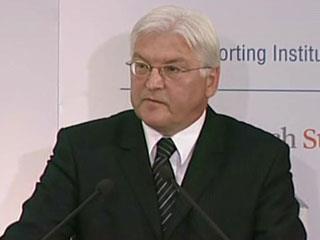Supposingly they were not very happy in the Berlaymont with Merkel’s decision to appoint a pro-Moscow veteran as Germany’s special coordinator for Russia policy.

Commission President Barroso and some of his Commissioners will not really be amused by Erler’s appointment. It sends a strong signal that the new German government wants a change of EU-Russia policy. Under the influence of some former communist EU member states a continuing ‘cold-war’ mentality prevails in the Berlaymont.
by
N. Peter Kramer
Gernot Erler is a longtime close ally of Frank-Walter Steinmeier, Foreign Minister and leader of Merkel’s current coalition partner Social Democrat Party. Erler was already coordinator for German-Russian relations at the time when Steinmeier was Chief of Staff of Chancellor Gerhard Schroeder, Merkel’s predecessor. In those days a direct gas pipeline from Russia to Germany (called Nordstream) which, through the Baltic Sea bypassed Poland and the Baltic states was secured. In Merkel’s first cabinet (2005-2009) Steinmeier became Foreign Minister and promoted Erler to State Secretary. Last month Steinmeier, a pro-Russian politician, was again sworn in as Foreign Minister in Chancellor Merkel’s third cabinet and insisted that Gernot Erler again became the position of special coordinator for Russia policy.
Commission President Barroso and some of his Commissioners will not really be amused by Erler’s appointment. It sends a strong signal that the new German government wants a change of EU-Russia policy. Under the influence of some former communist EU member states a continuing ‘cold-war’ mentality prevails in the Berlaymont. Last December the Commission announced suddenly that bilateral agreements for the construction of the Southstream pipeline through the Black Sea, concluded between Russia and 7 European countries during the last 6 years (the oldest contract is with Bulgaria, januari 2008!) were in breach of EU law and needed to be renegotiated from scratch.
The Russian Ambassador to the EU, Vladimir Chizhov, said yesterday, that if the European signatories to the Southstream bilaterals are not fulfilling their obligations towards Russia, Moscow is expected to take the issue to the international court. Russia considers the inter-governmental agreements valid under international law, which, in its view, has supremacy over EU law. Analysts are expecting Russia will be likely to win…




 By: N. Peter Kramer
By: N. Peter Kramer
